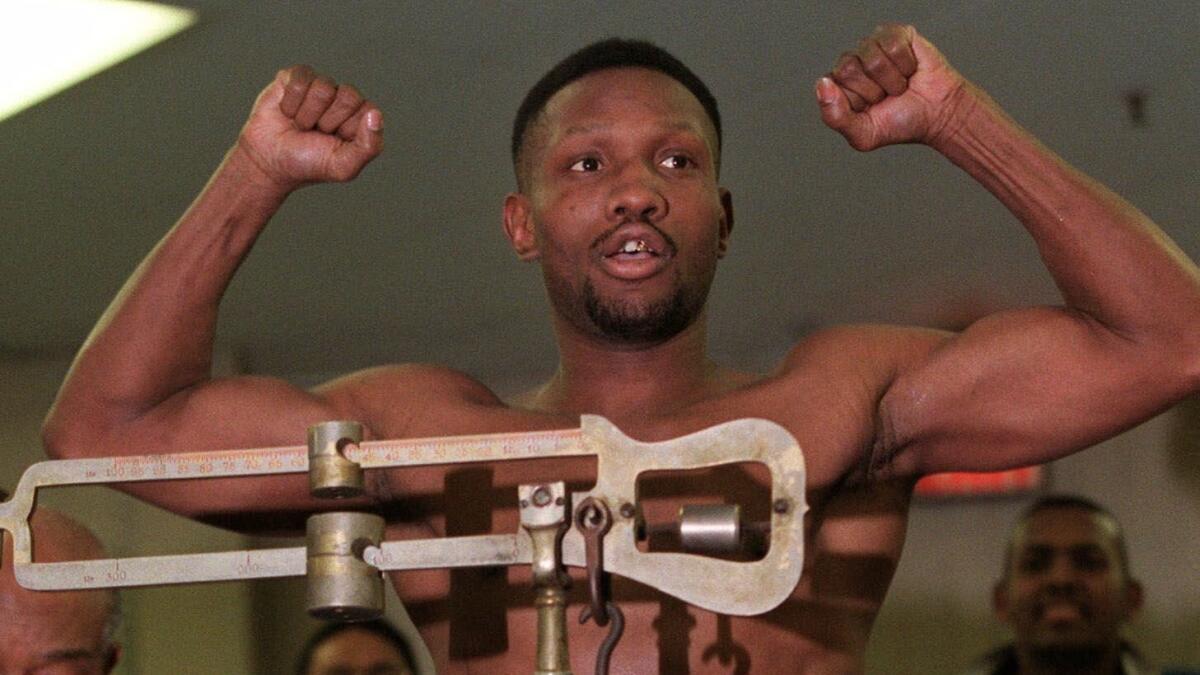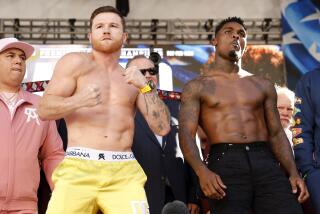Boxing legend Pernell ‘Sweet Pea’ Whitaker dies after being struck by a car

- Share via
Pernell Whitaker, heralded as one of the greatest boxers to ever lace up a pair of gloves, died Sunday night after he was hit by a pickup truck while walking across a wide thoroughfare in Virginia.
Whitaker, 55, died from his injuries on the scene. Virginia Beach Police said they were investigating the circumstances of his death. The driver of the vehicle remained at the scene after the crash.
Nicknamed “Sweet Pea,” Whitaker was a Hall of Fame fighter, a 1984 Olympic Gold medalist and a perennial pound-for-pound king during his 17-year career. The Norfolk-born southpaw was a four-division champion who finished with 40 wins —17 via knockout — 4 losses and 1 draw.
His lone draw against Julio Cesar Chavez in 1993 was arguably Whitaker’s finest hour as a professional; but the final scorecards from the mega fight told a different story.
By all accounts, Whitaker handily beat Chavez in front of more than 60,000 fans at the Alamodome in San Antonio. Chavez was undefeated in 87 fights at the time, and Whitaker out-landed him 311 to 220 and threw 153 more punches. It’s considered one of the most controversial decisions in boxing history, and the dubious scores elicited a Sports Illustrated cover with “Robbed!” written on it as Whitaker connected with a right hand on Chavez’s chin.
“I knew this might happen,” Whitaker said after the fight. “But still it was like a bad dream. Last night it was like someone put a knife in me and twisted it.”
Sign up for our daily sports newsletter »
A Sports Illustrated cover in 1994 billed him as “The Best,” and the label was an apt compliment for Whitaker, a pure pugilist in the ring who morphed his body with “Matrix”-like motions and danced around punches with panache. His masterful “hit but don’t get hit back” style is a blueprint today for defensive tacticians.
Trained by the duo of Lou Duva and George Benton, Whitaker fought out of a crouch and slipped around flustered opponents to much fanfare en route to becoming a champion in the lightweight, super lightweight, welterweight and super welterweight divisions. He turned pro at Madison Square Garden on national TV in 1984 and first became a world champion by outpointing Greg Haugen in 1989, a year in which he was declared “Fighter of the Year” by Ring Magazine and the Boxing Writers Assn. of America.
Whitaker dealt with a cocaine addiction and alcohol problems throughout his career and into retirement. He served time in prison after violating his probation on a conviction for cocaine possession in 2003.
According to the Virginia Sports Hall of Fame, where he is also an inductee, Whitaker won 201 of 214 amateur fights before turning pro after the 1984 Summer Games in Los Angeles. Whitaker was part of one of the best U.S. boxing teams in Olympics history, highlighting a group of 11 medalists that also featured Evander Holyfield and Meldrick Taylor. Whitaker also won a gold medal at the 1983 Pan American Games and a silver medal at the 1982 World Championships.
“I am saddened to learn of my good friend and Olympic teammate Pernell Whitaker’s untimely passing,” Holyfield tweeted Monday. “We share so many great memories. He was small in stature but yet so big in heart and skills inside the ring, there will never be another like him. He will truly be missed.”
Whitaker beat the likes of Hall of Famers Azumah Nelson and James “Buddy” McGirt twice, as well as Roger Mayweather. He avenged his first career loss from 1988 to Jose Luis Ramirez, a fighter with 102 career wins, by beating him in 1989.
“The boxing world lost a real great fighter and great man,” McGirt told the Los Angeles Times. “It was an honor to be in the ring with him twice. In the second fight, he hit me so much I thought I was surrounded. May God bless his soul and may he rest in eternal peace.”
Whitaker’s career was seemingly embroiled in controversial defeats. He also lost a disputed decision to Oscar De La Hoya in 1997, a fight many in boxing said that Whitaker won. Statistics showed that Whitaker out-punched De La Hoya that night 232 to 191.
“Of course [I won], but that really doesn’t matter,” Whitaker said after the fight. “As long as the world saw it, then the people can say who won the fight. I should have gotten 10 out of 12 rounds. It was a shutout. For 12 rounds, he took punishment, he took a beating. He can have the title but we know who the best fighter is.”
De La Hoya offered his condolences Monday after learning of Whitaker’s death.
“In terms of his defense and ring generalship, Pernell Whitaker was the best fighter that I ever fought. It was an honor to share the ring with him,” De La Hoya said. “I’m deeply saddened by the loss of this great champion, who gave a tremendous amount of joy to those who watched him.”
The penultimate bout of Whitaker’s career was a one-sided decision loss to Felix Trinidad in 1999, and a proverbial passing of the torch to the next generation. For his final fight in 2001, Whitaker suffered a broken clavicle during a fourth-round stoppage loss to the unheralded Carlos Bojorquez and retired afterward.
During retirement, Whitaker stayed involved in the sport as a trainer in the Virginia Beach area and made appearances at promotional events. He was scheduled to be in Las Vegas this Saturday for the Manny Pacquiao-Keith Thurman fight and partake in ceremonious activities around town.
“He was a flawless fighter,” Mike Tyson said on his Twitter account on Monday.
“One of the best fighters to ever do it,” Floyd Mayweather said in an Instagram post featuring a picture he took with Whitaker just two days ago.
“Pernell Whitaker was beautiful — both as a fighter and as a human being … giving fans many unforgettable moments,” HBO, which broadcasted 19 of Whitaker’s fights, announced in a statement. “He was an artist in the ring.”Akopyan has been a member of the Boxing Writers Assn. of America since 2011 and has written for USA Today and the Guardian.
More to Read
Go beyond the scoreboard
Get the latest on L.A.'s teams in the daily Sports Report newsletter.
You may occasionally receive promotional content from the Los Angeles Times.










